|
|
|
Sort Order |
|
|
|
Items / Page
|
|
|
|
|
|
|
| Srl | Item |
| 1 |
ID:
105369
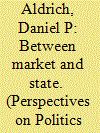

|
|
|
|
|
| Publication |
2011.
|
| Summary/Abstract |
Developed and developing nations alike face low-probability but high-consequence exogenous shocks, including ice storms, chemical spills, terrorist attacks, and regional blackouts. Recently, "natural" disasters have dominated the airwaves; mega-catastrophes that claim more than 1,000 lives have become an almost yearly occurrence. In 2010, the Haiti and Chile earthquakes killed more than 200,000 people between them and felt all too familiar to many observers in the West. Before them were Cyclone Nargis in Burma, which took 130,000 lives in 2008; Hurricane Katrina, which killed more than 1,500 New Orleans residents and left 80% of the city flooded in 2005; and the Indian Ocean tsunami, which claimed roughly a quarter of a million lives in India, Indonesia, Sri Lanka, and Thailand in 2004.
|
|
|
|
|
|
|
|
|
|
|
|
|
|
|
|
| 2 |
ID:
146635
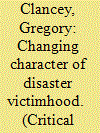

|
|
|
|
|
| Summary/Abstract |
Japan is periodically wracked by “Great Earthquakes” (daijishin) – seismic events so destructive that they leave massive amounts of textual and graphic evidence, much of it produced by people who did not experience the events directly. Using this cache of information, it is possible to see how the idea of the “disaster victim” has changed over time and circumstance. My paper traces this role across five Great Earthquakes that spanned roughly 150 years (1855–2011), a period convergent with modern Japan. I will argue that the sense of who and what has been victimized by the shaking of the earth – who has suffered, what weight to attach to their loss, what actions to take and emotions to feel regarding their situation – has changed regularly, and surprisingly, over this rather short period. There is, in other words, no common Japanese experience of victimhood, even in the context of one disaster type over a relatively short historical period. The article is one contribution to an as-yet unexamined history and comparative study of the modern role of disaster victim.
|
|
|
|
|
|
|
|
|
|
|
|
|
|
|
|
| 3 |
ID:
102717
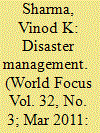

|
|
|
| 4 |
ID:
102715
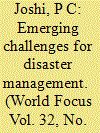

|
|
|
| 5 |
ID:
102018
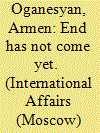

|
|
|
|
|
| Publication |
2010.
|
| Summary/Abstract |
THE SMOKE OF BURNING PEAT BOGS and forests and the losses they caused detracted us for a while from the far from comforting picture of planetary dimensions. Here is the frightening statistics of the year 2010 when big and small catastrophes shook the world: erupting volcanoes grounded aircrafts all over Europe; earthquakes hit many countries; the record-hot summer caused drought in Russia while Europe was nearly inundated. This suggests a logical question: what next? Indeed, to be prepared we should know what is in store for us. The answer is simple: anything might happen.
|
|
|
|
|
|
|
|
|
|
|
|
|
|
|
|
| 6 |
ID:
079525
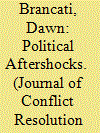

|
|
|
|
|
| Publication |
2007.
|
| Summary/Abstract |
Although many scholars, policy makers, and relief organizations suggest that natural disasters bring groups together and dampen conflicts, earthquakes can actually stimulate intrastate conflict by producing scarcities in basic resources, particularly in developing countries where the competition for scarce resources is most intense. Capitalizing on a natural experiment design, this study examines the impact of earthquakes on intrastate conflict through a statistical analysis of 185 countries over the period from 1975 to 2002. The analysis indicates that earthquakes not only increase the likelihood of conflict, but that their effects are greater for higher magnitude earthquakes striking more densely populated areas of countries with lower gross domestic products as well as preexisting conflicts. These results suggest that disaster recovery efforts must pay greater attention to the conflict-producing potential of earthquakes and undertake certain measures, including strengthening security procedures, to prevent this outcome from occurring
|
|
|
|
|
|
|
|
|
|
|
|
|
|
|
|
| 7 |
ID:
185926
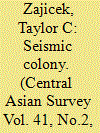

|
|
|
|
|
| Summary/Abstract |
For much of Russia’s fractious history, the earth’s stability at least could be taken for granted. The imperial heartland was situated deep on the Eurasian tectonic plate, rarely experiencing fatal seismic activity. As the empire expanded, however, it acquired several of Eurasia’s most earthquake-prone regions. This interplay between colonization and seismic landscapes produced a novel entity: the ‘seismic colony’. With its occasional earthquakes and perpetual risks, the seismic colony posed a significant challenge to Russian rule, particularly in Turkestan. Earthquakes devastated infrastructure, gave lie to the civilizing mission and fostered social disorder, thereby undercutting the technologies of rule that the empire relied on to exploit the region. Engaging analytical tools from the history of environment and technology, this article details this threat and the developments it prompted from Russian experts and settlers, including first-response efforts, reconfigured construction practices, and the concretization of seismology as a science and infrastructure.
|
|
|
|
|
|
|
|
|
|
|
|
|
|
|
|
| 8 |
ID:
103928
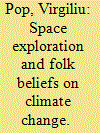

|
|
|
|
|
| Publication |
2011.
|
| Summary/Abstract |
This article surveys a series of folk beliefs of currency at the time of the Apollo missions, that link space exploration with disastrous events occurring at the same time. Floods, droughts, earthquakes and conjunctivitis-all were blamed, by people pertaining to very different cultures, on the actions of reckless astronauts who irked the Divinity or disturbed the celestial mechanics. As will become evident, these folk beliefs fit an existing pattern explainable in the context of "cultural lag" and "future shock." These social phenomena are common to sociology, and when referring to the context of outer space, fall under the purview of astrosociology.
|
|
|
|
|
|
|
|
|
|
|
|
|
|
|
|
| 9 |
ID:
145389
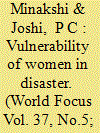

|
|
|
|
|
| Summary/Abstract |
Disaster in India is not a new phenomenon. It has witnessed devastating natural catastrophe in recent past like droughts, floods, cyclones, earthquakes, landslides, etc and as a result millions of people each year have been affected with varied impact.
|
|
|
|
|
|
|
|
|
|
|
|
|
|
|
|
|
|
|
|
|